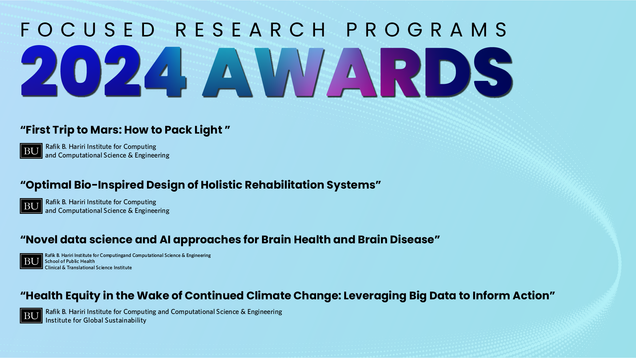Hariri Institute 2024 Focused Research Programs

The Hariri Institute for Computing’s Focused Research Programs (FRPs) support intensive, faculty-driven efforts in large, multi-disciplinary teams. The FRP mission is to evolve and advance Boston University’s research in computing, computational, and data-driven science and engineering around areas of strategic importance and emerging opportunity.
The Institute has awarded four 2024 Focused Research Programs awards targeting space travel, bio-inspired robots, climate-related health inequities, and brain health and brain disease.
2024 Focused Research Programs
First Trip to Mars: How to Pack Light
This FRP is designed to support NASA’s plans to land humans on Mars in the 2030s. It is led by Marianna Felici, Research Scientist at the Center for Space Physics, and Paul Withers, CAS Professor of Astronomy and Associate Director of the Center for Space Physics. The program includes three research thrusts, each with its own goal, and these three goals are interwoven: 1) Ionosphere and Surface, whose goal is to model, from data, one specific region of the Martian atmosphere, the ionosphere, that responds to changes happening above it, like solar activity, and below it, like dust storms on the surface; 2) Navigation and Infrastructure, whose goal is to model the impact that the Martian ionosphere would have on navigation systems; and 3) Microbes, whose goal is to engineer microbial communities capable of carbon sequestration and nutrients production on the Martian surface and similarly extreme environments. This project represents the first building block toward the researchers’ ultimate goal: a research center to support human travel to Mars in a holistic and sustainable way.
Health Equity in the Wake of Continued Climate Change: Leveraging Big Data to Inform Action
The health risks of climate change are unevenly distributed, with the most vulnerable individuals and communities disproportionately impacted. The complexity with which determinants of risk interact spatially and temporally necessitates that climate equity analyses use new, interdisciplinary, data-driven approaches. This FRP will advance three complementary but distinct thrusts with the goal of providing the BU climate and health research community access to shared resources to accelerate research, innovation, and translation in this area. The program is led by Greg Wellenius, BUSPH Professor of Environmental Health and Director of the BUSPH Center for Climate and Health, and Lucy Hutyra, CAS Professor of Earth & Environment, Director of the Biogeoscience Program, and Associate Director of the BU Initiative on Cities. Research thrusts include 1) Creating shared data resources to accelerate the pace of research and translation, 2) Advancing methods to visualize climate vulnerability and inequity to inform action, and 3) Modeling the health benefits of heat adaptation strategies. This FRP is co-sponsored with the Institute for Global Sustainability (IGS).
Optimal Bio-Inspired Design of Holistic Rehabilitation Systems
This FRP aims to advance the state-of-the-art of bio-inspired robots that provide effective everyday physical assistance. It is led by Eshed Ohn-Bar, ENG Assistant Professor of Electrical and Computer Engineering and Computer Science, and Alexander Olshevsky, ENG Associate Professor of Electrical and Computer Engineering and Systems Engineering. The overarching goal is to develop optimal bio-inspired methods and hardware design for seamlessly integrated human-robot systems, particularly for supporting rehabilitation and individuals with physical impairments. The PIs will develop theory-informed principles embedded into a lightweight and adaptable system to realize efficient, safe, and intuitive wearable robots for broad mobility assistance across users, tasks, environmental conditions, and disabilities. The research program will include three thrust areas: 1) Optimal and Efficient RL from Humans, 2) Customizable Mobility Systems for Neuromotor Rehabilitation, and 3) Bio-inspired Design of Soft Robots with Enhanced Safety and Efficiency.
Novel data science and AI approaches for Brain Health and Brain Disease
This FRP brings together clinicians, neuroscientists, engineers, biostatisticians, computer and data scientists with the objective of connecting methodologies with scientific questions related to detecting, preventing and treating brain disease. To facilitate these outcomes, different research labs and sub-communities of research groups will participate in overlapping yet complementary research thrusts. The FRP will provide the infrastructure for preparing for a series of grant proposals and research collaboration within and across three research thrusts: 1) Continuous Brain Monitoring, 2) Brain Fingerprinting, and 3) Digital Health. The overall leader of this program is Dr. Swathi Kiran, SAR James and Cecelia Ying Professor of Neurorehabilitation, and the Founding Director for the Center for Brain Recovery. This FRP is co-sponsored with the School of Public Health and the Clinical & Translational Science Institute (CTSI).
Hariri Institute FRPs are designed to facilitate research convergence by providing ‘scaffolding’ for groups to coalesce in sustainable ways, with the goal of accelerating research for future funding and broader impact. Learn more about the Institute FRP program here.